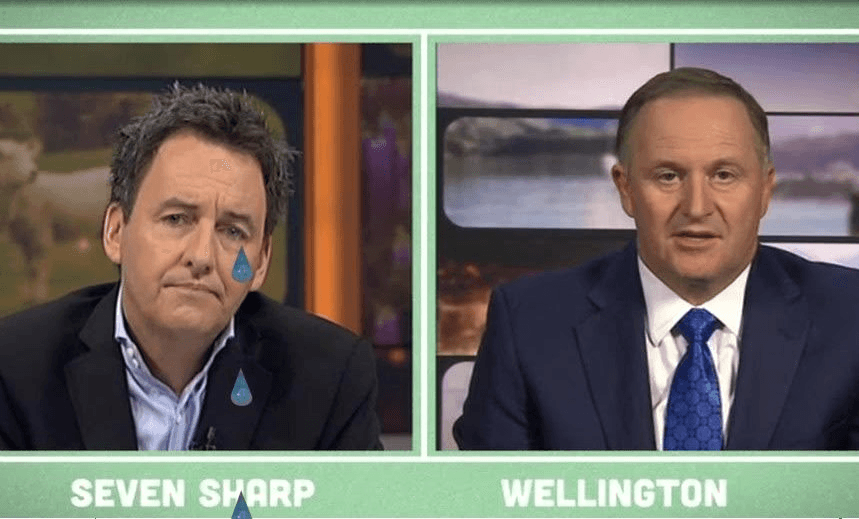Every night the television news happens at 6pm and current affairs shows happen at 7pm. Normally nothing much has happened. Yesterday though, John Key resigned, so Duncan Greive watched our nation’s finest broadcasters try and figure out what it all meant.
Yesterday – you may have heard – our prime minister resigned after eight fun-filled years at the top. This is the kind of major political change which comes along roughly every 18 months in Australia, but has only happened twice this millennium in New Zealand.
The last time it did we were chatting online on Facebook, talking on our iPhones and the world was suffering through the after effects of the financial crisis. Imagine.
One thing which has changed is that television news was The Thing back in 2008, whereas now it seems slightly quaint – or, at the very least, it’s gone from being the place where news was broken and discussed to where it is processed, hours (whole hours!) after the fact.
I watched the 6pm bulletins, which now both have horrible new names, and their 7pm magazine-style siblings, to see what they made of it all. TV3 came in most dramatically, with Mike McRoberts standing alongside some giant screens – something Simon Dallow wouldn’t do until 10 long minutes had passed on the other channel. TV3 also trusted their youth movement, all those fresh-faced grads who’ve formed a kind of journalistic Baby Blacks after Weldon’s great fire of 2015. Maiki Sherman was reporting live and strong from outside parliament, and later some terrifically hairy young man interviewed John Key for Story. It was good solid, context-laden reporting, covering that which had to be covered: the conjecture over motive and replacement; the opposition’s mealy-mouthed tributes (Peters’ magnificently excepted); a recap of that long success-strewn career.
All of that was basically fine and good but also annoying because what we wanted was Paddy “it’s the fucken news” Gower. We wanted his eyes popping. We wanted his sentences no more than three words long. We wanted him to say “This – changes – EVERYTHING!”
We got it all. Patrick Gower had been at home mowing the lawns, an activity I imagine he does maniacally and daily, like my grandfather. “That’s over. That’s you. That’s finished,” he said. Then: “Make no mistake – this changes EVERYTHING.”
McRoberts is long past being startled by Gower’s pronouncements, and closed by asking what EVERYTHING might mean as pertains to policy. Gower said something about the age of eligibility for superannuation being potentially back on the table. Oh.
Then it was off into “Gangnam Style” and the three-way handshake and “mincing” and planking and the everyman dorkability which has been what has made Key the perfect prime minister for the relatable era. These classic gags were also a fixture of TVNZ 1’s coverage, which weirdly opens with the weather now, even when a prime minister shocks the country by resigning.
They don’t bury their political editor so deep – or maybe someone mows Corin Dann’s lawns for him (not relatable) – but he essentially ran the coverage from inside the debating chamber. It feels symbolic and instructive that TVNZ are inside while TV3 yell across Lambton Quay. Dann and Katie Bradford had a good quick chat, but the voids at the heart of this story – why and who – were stubbornly hard to fill, especially at five hours’ notice.
Never mind – 7pm current affairs, that’s where the substantive analysis of the day’s big news goes, right? Garner and Hosking, running wild, running free over the biggest New Zealand political curveball of the decade.
Nope. A total of ten minutes on Story and a shocking seven minutes on Seven Sharp. Each was dominated by interviews with Key, which is fair. Story’s was conducted by Ryan Bridge, who really does have a tremendous amount of hair. From behind I initially thought it was Heather Du Plessis-Allan, sweetly brought back from MediaWorks Siberia for the big moment. Like I said, the kid has a lot of hair.
Bridge handled the big get well, asking, along with the predictable legacy questions, a very pointed one about Pike River. “I wish I could do what they want me to do,” he answered, and already there was a touch more sincerity in his tone than the supreme political animal we’ve been used to.
Hosking – who, and I cannot stress this enough, still has spiked up teen hair – conducted Seven Sharp’s via satellite over on the other channel. It lasted around three minutes. Hard questions were asked, like this: “For the record, this is what it seems – a bloke who’s done eight years [as PM] and 10 years [as leader]. Thanks, we’re done.” Which isn’t so much a question as re-characterising Key’s presser for him.
The main part was Hosking dismissing English as Key’s replacement. “Every time I interview him John, I’ve got to check that he’s got a pulse … He doesn’t have that magic leadership thing.”
What it really felt like he was saying is that English, while politically talented, is not great talent. He won’t do all those breakfast radio stunts, and offer a studiedly bland opinion on anything in the entire world. Which is why, as much as anything, Hosking and his commercial radio brethren will be mourning today. Their shows, already pretty dull, will likely be duller as a result.
When the moment comes, the news can still do a pretty good fist of what it all means. But the 7pm current affairs shows are completely at sea – smashing it out quick at the top so they can get to their joking around with Coldplay or Keith Urban. Which just seems a bit sad and weird.



